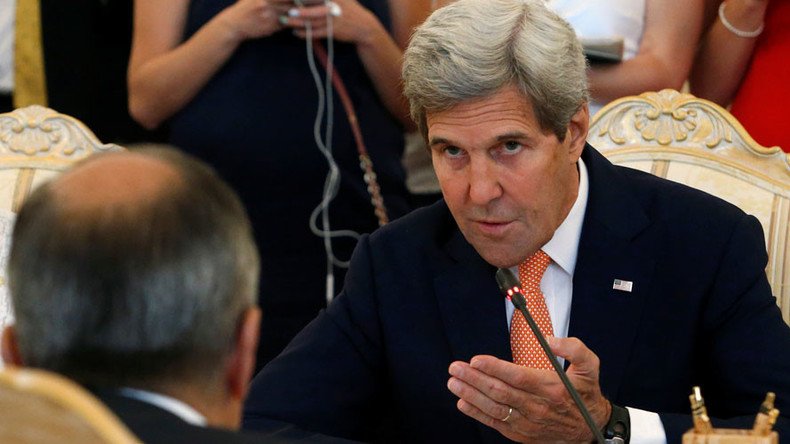With Washington’s Syria policy in disarray, Kerry goes to Moscow...again

Five years ago, Barack Obama confidently told the world that Syrian President Bashar Assad’s days were numbered. It was only a matter of time before he’d be pushed out, whether he liked it or not, the conventional wisdom went.
The entire foreign policy establishment was in agreement. US officials issued statements to the same effect, over and over again. There was no way Assad could survive. He would go the way of Mubarak and Gaddafi, they were sure of it.
It’s this massive miscalculation that lies behind the chaos and haphazardness of Washington’s approach to the Syrian crisis since then. The Obama administration clung stubbornly to the line that Assad’s days were numbered even when all evidence indicated otherwise.
Five years on and we’re witnessing a rift in Washington over how to deal with the aftermath of getting it so very wrong, yet again. While one faction wants to plough ahead on the same failed path (not an unusual inclination in Washington), there is another faction which has become slowly, but reluctantly willing to accept that working with Russia on the Syria question may be the only way forward.
Good terrorists and bad terrorists
Washington’s Syria narrative always rested on the notion that there were essentially good rebels and bad rebels fighting Assad. The bad rebels were of course jihadist militant terror groups like ISIS and Jabhat al-Nusra, al-Qaeda’s Syria branch. The good rebels were, well, no one really knew, but they were the guys the US supported. Often we were told that they were part of Ahrar al-Sham and Jaysh al-Islam, two rebel groups who had escaped being named as terror groups by Washington.
Find the right #Syrian rebel to arm - non-trivial task to start your day with | #Syria#سوريا#ISIL#Nusra#داعشpic.twitter.com/Gc60dVAn7D
— Russian Embassy, UAE (@RusEmbassyUAE) October 5, 2015
That was until Secretary of State John Kerry threw them under the bus last month by labeling them “subgroups” under Daesh (ISIS) and Nusra. Perhaps it was a slip of the tongue, the truth slipping out when it wasn’t meant to, but it’s a comment that Washington Post columnist Josh Rogin said had “set off alarm bells”inside the Obama administration with some officials furious at Kerry for the “inaccurate and potentially harmful” classification.
To give some context, Zahran Alloush, the former leader of the Saudi-supported Jaysh al-Islam was hailed as a “middle-ground”kind of guy in Western media and his death reportedly at the hands of Russian bombers (although claimed by the Syrian government forces) was seen as a blow to the moderate rebel cause. This despite Alloush’s anti-Shiite tirades, denunciations of democracy and professed desires to see an Islamic state of some description replace Assad in Syria. In other words, he wasn’t ISIS, but on his worst days, he might as well have been.
But how did we get to the point when even John Kerry seems to be mixing up his rebel groups and now appears to be looking to the Russians for increased cooperation in solving the Syria mess? The simple answer may be that, finally, reality has begun to catch up with him.
A narrative doomed to fail
As the war dragged on, Washington had sought to build a credible opposition to Assad. To help the process of his ouster along, they poured money into training and arming the ‘right’ guys on the ground, without really knowing who they were.
They tried to sell the line that this plan was working — that a credible, “moderate” opposition existed. By and large, the media bought it. The narrative was also echoed by American allies like former British Prime Minister David Cameron who announced that 70,000 moderate rebels existed — a claim later denied by the Ministry of Defense. In reality, the Syrian opposition was in complete disarray; multiple factions fighting both Assad, ISIS and each other. Some radical, some less radical, but very few which could be classified as “moderate” — particularly when groups like Amnesty International began accusing some of these West-backed groups of committing massive war crimes and imposing strict Sharia law.
While Obama and his allies in the West were wasting time and money trying to oust Assad as priority number one, ISIS was running riot amidst worsening chaos.
It became increasingly difficult to ignore the fact that some of the US’s so-called “moderates” were indeed fighting alongside Nusra — not out of a meeting of minds, we were told, but out of necessity. As if that made it any better. It reached a tragically embarrassing point when Russia entered the conflict and Washington found itself essentially asking Moscow to stop bombing the al-Qaeda affiliate because the so-called “moderate” rebels were among them. If that didn’t demonstrate how implausible the US’s ‘strategy’ for Syria was, nothing would. Washington’s credibility was shot, but outwardly it still pursued the same goals and touted the same false narratives.
US asked Russia to stop bombing Al-Qaeda, because the "moderate" rebels are among them. pic.twitter.com/VDsASJkhA6
— Danielle Ryan (@DanielleRyanJ) February 21, 2016
With Russia’s entry to the war, Assad was strengthened yet again. Unsurprisingly, this prompted another major miscalculation in Washington, with officials initially dismissing Russia’s presence as a move made out of desperation; a silly attempt by Vladimir Putin to show off his military toys. It would be his fatal mistake, they said. Russia would find itself further isolated by the ‘international community’ and stuck without allies in a Syrian quagmire of its own making. Some analysts went as far as to suggest that Putin’s decision to bring Russia into Syria’s war would be his own undoing at home.
Back-peddling
As it turns out, none of that happened. Instead, in recent months, the US has found itself flailing so badly over its botched Syria policy that it has had no choice but to slowly back-peddle, even appearing at times to come around to Russia’s way of thinking on the crisis — a far cry from its initial impulse which had been to openly and incessantly criticize Russia’s military presence in Syria to distract from its own failure.
Slowly but surely calls for Assad’s immediate departure quietened down. It became harder to sell the idea that Assad was a bigger barrier to peace than ISIS. As the migrant crisis worsened and terrorist attacks hit cities like Belgium, Paris, Istanbul — and now tragically, Nice — even European leaders began softening on Russia, arguing that working with Moscow would be beneficial; that ISIS was the main target, not Assad. And so, after months of stubbornly refusing to even consider closer cooperation with Russia in Syria, Kerry has come to Moscow armed with new proposals for the two countries to work together to tackle ISIS. This is a phenomenal turnaround for an American administration that a year ago was pursuing a policy of complete isolation against Russia.
Naturally, Washington would like to portray any new cooperation as instigated by themselves to end the violence in Syria as quickly as possible. In reality, this semi-progress comes only after months and months of the Obama administration dragging its feet, refusing time and again to cooperate with Moscow — despite multiple invitations to do so.
After months of US refusals to cooperate with Russia, media now paints new talk of deal as instigated by Washington pic.twitter.com/94P7GIusIl
— Danielle Ryan (@DanielleRyanJ) July 15, 2016
Hesitant hawks
It’s important to remember that despite Kerry’s presence in Moscow this week and continued talk of increased cooperation between the two powers, there will still be massive push back in Washington against any sort of temporary alliance with Moscow. Most prominently, Secretary of Defense Ash Carter still appears to be against the idea of trusting Moscow — and he is not alone. While supporters of Moscow-Washington cooperation believe it is worth the effort to save lives, others are more interested in saving the US any embarrassment that would come from a change in strategic direction, particularly if that involved working in conjunction with the Russians.
One analyst with the Washington Institute for Near East Policy, Andrew J. Tabler, told the Washington Post that Kerry’s plans for cooperation with Moscow are “all in the name of saying . . . that they’re saving lives and targeting terrorists. But what it will do strategically will mean the regime will simply stand by while we hit the terrorists, and the regime will benefit from that.”
Tabler continued, unabashed: “This is defeat — I think everybody is beside themselves because this is all being done in the name of a cease-fire . . . the best thing we can do to reduce the violence. But in effect, it’s crafted in such a way that it strengthens the regime, the opposite of what we say we want.” Translation: Saving lives is not as important as saving face.
Worse still, Atlantic Council analyst Frederic C. Hof wrote that as desirable as it might be to hit al-Qaeda, working with the Russians to do it is not feasible, because of long term costs to “America’s reputation” — costs that would exceed the “here and now body count”.
Of course, it is plausible that with Kerry’s latest visit to Moscow, Washington is simply trying to buy more time, protect its rebels (whoever they are) from Russian bombs and string Moscow along with false promises of working together.
But if Kerry, backed by Obama, truly is interested in pursuing real cooperation with Russia, the psychopathic view of events expressed by the likes of Tabler and Hof is exactly what he is up against in Washington. And what little progress could be made in the coming months may be swiftly undone if Obama’s likely successor and Syria hawk Hillary Clinton wins the presidency in November.
The statements, views and opinions expressed in this column are solely those of the author and do not necessarily represent those of RT.













